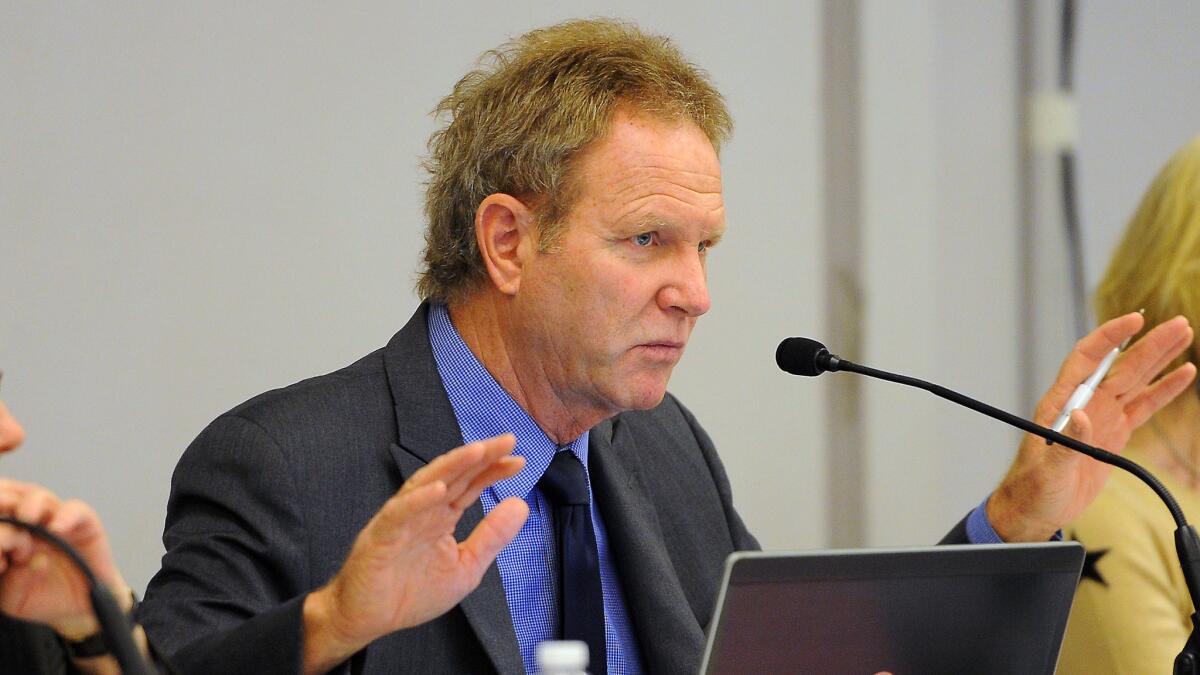Coastal Commission chairman recuses himself from Banning Ranch vote

Under scrutiny for failing to report private meetings with developers, California Coastal Commission Chairman Steve Kinsey announced Wednesday that he will not vote on the proposed Newport Banning Ranch project.
“The law is very clear. Ex-partes must be filed within a seven-day period,” Kinsey said at the start of the commission’s monthly meeting. “So I have made the decision…. I will recuse myself.”
Slated to go before the commission this year, the Banning Ranch proposal to build nearly 900 homes and a hotel on an Orange County oil field is one of the largest coastal projects in years. The developers and their agents have repeatedly met with commission members to discuss the proposal -- meetings that commissioners are required to promptly report as so-called ex-parte communications.
See the most-read stories this hour >>
The Times has reported that Kinsey failed to do that on two occasions last year. He didn’t disclose a November meeting with members of the Banning Ranch team and didn’t report a December tour of the project site until May, after The Times questioned him about the visit.
Under the Coastal Act, if commissioners don’t promptly file ex-parte disclosure forms, they are not supposed to participate in any deliberations or votes on the matter -- and doing so could invite legal challenges to the commission’s actions.
Kinsey noted that in explaining his decision to recuse himself. “There are real risks to this commission for those who don’t pay attention to that law,” he said.
The panel has been in the spotlight ever since it fired Executive Director Charles Lester in February, sparking a public outcry and claims by critics that commissioners are pushing the agency to be more receptive to construction projects.
In another development, Commissioner Martha McClure lost her bid Tuesday to retain her seat on the Del Norte County Board of Supervisors.
That means McClure, who was appointed by Gov. Jerry Brown and voted to fire Lester, will have to leave the commission early next year.
The Coastal Commission is one of only a few state boards, commissions and agencies allowed by the Legislature to have ex-partes, which are private verbal or written communications between a commissioner and an interested party that could influence a decision.
A Times review of ex-parte records found that most participants are development interests and their agents, but the ranks include environmentalists, government officials and members of the general public.
The state Senate last month approved legislation that would ban the communications. The commission voted 6 to 5 to support the bill, with Kinsey among those endorsing the measure.
In his remarks Wednesday, Kinsey specifically referred to the Nov. 4 meeting that he and commissioner Dayna Bochco had with three Banning Ranch representatives. Bochco disclosed the session two days later but Kinsey did not.
“It was brought to the attention of myself and the public that in November I had neglected to file an ex-parte on the matter regarding Newport Banning Ranch…. Shame on me,” he said, adding that he was “disappointed” in himself.
Join the conversation on Facebook >>
In December, Kinsey also spent several hours touring Banning Ranch with members of the development team. A few weeks later he emailed staff Deputy Director Sherilyn Sarb, disputing the staff’s environmental assessments of the site, which commission ecologists had concluded harbored a great deal of sensitive habitat that should be off limits to development.
But Kinsey didn’t file an ex-parte form detailing the tour until The Times questioned him about his email, which was obtained through the Public Records Act. He described the failure to promptly disclose the visit as an oversight during the busy holiday season.
Twitter: @boxall
MORE POLITICS NEWS
Unusual election outcomes are the new normal with California’s top-two primary rules
Super PAC focused on GOP voters to back U.S. Senate candidate Loretta Sanchez
Kamala Harris says she’s the U.S. Senate candidate who can unify Californians
More to Read
Sign up for Essential California
The most important California stories and recommendations in your inbox every morning.
You may occasionally receive promotional content from the Los Angeles Times.










